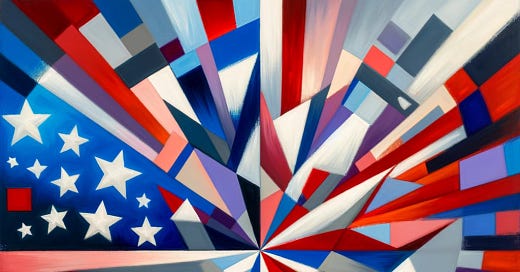Social Media täuscht uns! Die große Mehrheit der Menschen ist moderat
In 2016, only 3 percent of Americans identified themselves as "extremely liberal," and another 3 percent identified themselves as "extremely conservative." In contrast, a strong plurality of Americans (47 percent) said that they were "moderate," "slightly liberal," or "slightly conservative."
These figures are even more revealing when one recognizes that nearly one in five Americans told researchers that they either "didn't know" what their ideology was or "had not thought about it."
Social media can make it seem as though ideological polarization is growing rapidly, but rates of partisanship are actually fairly stable, and they appear more related to the ways in which the Republican and Democratic Parties have reorganized their policy platforms to appeal to different combinations of voters, rather than shifts in the opinions of voters.
Sara's sympathy for immigrants is also not as rare among Republicans as some Democrats might think.
In 2018, the American National Election Study asked whether "having an increasing number of people of many different races, ethnic groups and nationalities in the United States makes this country a better place to live."
Among Republicans, 38.9 percent agreed with this statement, 28.8 percent said the increasing number would "[make] no difference," and only 32.3 percent disagreed.
The same survey also showed that most Republicans share Sara's belief that background checks for gun purchases should be mandatory: 66.2 percent of Republicans favored mandatory checks, 19 percent opposed them, and an additional 12.6 percent indicated they "don't know."
Similarly, some Republicans might be surprised by how many Democrats have beliefs that are out of step with pervasive stereotypes about their party.
More than three out of five Democrats have positive feelings toward the police and rural people, for example.
I do not want to overstate similarities between Republicans and Democrats (on many issues, the two parties remain deeply divided), but it is fair to say that most Americans are not as extreme as one might think after spending an hour or two on social media.
Und:
Like most moderates, Pete has relatively little exposure to politics online—and even less exposure to Republicans.
For this reason, the threat his cousin received left a deep impression on Pete.
Like so many of the moderates we interviewed (on both sides), Pete's encounters with extremists from the other party have shaped his views of Republicans more broadly.
The social media prism thus exerts profound influence upon a phenomenon that social scientists call false polarization.
This term refers to the tendency for people to overestimate the amount of ideological differences between themselves and people from other political parties.
Und:
As the stories of Pete and many others we interviewed illustrates, false polarization can be driven by online experiences in which a minority of extremists come to represent a more moderate majority.
I broke down data from the Pew study that I just described to compare people who listed social media as their preferred source of news and those who did not.
I found that the partisan perception gap—that is, the extent to which people exaggerated the ideological extremism of people from the other party—was significantly larger among those who used social media to get their news.
The link between social media usage and false polarization is also driven by the fact that extremists post far more often than moderates.
A 2019 report from Pew showed that a small group of people is responsible for most political content on Twitter.
Specifically, this report found that "prolific political tweeters make up just 6% of all Twitter users but generate 20% of all tweets and 73% of tweets mentioning national politics."
What is more, extremists represented nearly half of all prolific political tweeters.
Though people with extreme views constitute about 6 percent of the U.S. population, the Pew report found that "55% of prolific political tweeters identify as very liberal or very conservative."
There is even more evidence that people who use social media tend to develop more inaccurate perceptions of the beliefs and behaviors of those in the other party.
Aus dem Buch “Breaking the Social Media Prism” von Chris Bail.




